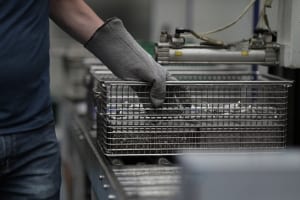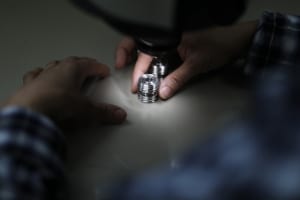“Enterprise Ireland has been so supportive over the years, it’s not just about money. What they do is open your eyes to opportunities.”
CEO, Stephen Hogg
Key Takeouts:
- Bellurgan Precision specialises in solving complex design and manufacturing issues, focusing on the medical device and aerospace sectors among others.
- Competitors in low cost countries meant that Bellurgan must continually add value to their offer in order to stay ahead of the curve.
- Project support from Enterprise Ireland enabled them to invest in new technologies and training in order to build capabilities and reduce production times.
Case Study: Bellurgan Precision
Components produced by Bellurgan Precision at its state-of-the-art facility on the Cooley Peninsula can be found in a range of high-tech products, ranging from medical devices, aircraft parts, and electronic systems, developed by some of the world’s leading manufacturers.
Having recently celebrated 40 years in business, the family-owned company employs close to 100 people, generating worldwide sales of €12 million, and is targeting annual growth of between 15% and 20% over the next three to four years.
For companies in the sector, remaining competitive is a challenge. Bellurgan’s success is built on a combination of engineering expertise, quality, and an unwavering commitment to customer service. The company’s focus on operational excellence enabled it to add value beyond simply competing on cost, as Bellurgan Precision invests in innovative technologies, processes and skills to get ahead of international competition.
Selling engineering expertise
“We don’t really have a product,” says CEO, Stephen Hogg. “We sell engineering expertise. Our success is built on deep engineering capability and quality standards. We have an excellent team committed to solving complex design to manufacturing problems. When a customer comes and sits down to talk about the product they want us to make for them, they often leave two days later, having found that there are far fewer parts involved than they first thought.”
This is very important in the highly regulated medical devices areas.

“70% of the cost of a product is locked in at the design stage,” Hogg explains. “We help our customers cut out costs at that point. These products have to be approved by the FDA and so do the supply chains. It’s very hard to change the design of a product once it has been approved.”
The company’s principal focus is on the medical devices and aerospace sectors, with many of the world’s top companies on its highly impressive customer list.
“This is largely driven by demographics,” Hogg points out. “The global population is expanding, and there is strong growth in the middle classes, in countries like India and China, which is increasing demand for services such as healthcare and travel.
Competing against low-cost countries
“We are either a Gold partner or number one supplier with all of our customers, who are all global multinationals,” he continues. “Virtually everything we do is exported. Less than 1% is used on domestic market. We might sell products to multinationals based in Ireland, but they will ultimately integrate them into products which are shipped around the world.”
“Remaining competitive is a constant challenge. “We have to compete against low-cost countries, and this means continuously adding value for our customers and investing in new technologies, processes and skills to stay ahead,” says Hogg.
Support from Enterprise Ireland for continuous improvement
“Enterprise Ireland has been so supportive over the years,” he adds. “It’s not just about money. What they do is open your eyes to opportunities. They took us on visits to world-class players like the Mayo Clinic and Cleveland Clinic. We were able to hear world-class clinicians talking about their work and this was a great help to us. Enterprise Ireland also strongly supported our continuous improvement programme – we just couldn’t compete without that.”
 One example of that programme was the implementation of lights out manufacturing. This allows a highly sophisticated machine to run 24/7 while only being attended to for one shift a day. The pallets are set up by the operative and automated process takes over after that.
One example of that programme was the implementation of lights out manufacturing. This allows a highly sophisticated machine to run 24/7 while only being attended to for one shift a day. The pallets are set up by the operative and automated process takes over after that.
“We have also bought a robotic system to help place parts and that gives us the flexibility to make better use of high-end machines”, Hogg adds. “Enterprise Ireland has also helped us with our investment in these technologies. We have participated in a number of different Enterprise Ireland programmes, with the most recent one being Lean. It impacts everything. The great thing is that it is open to everyone to get involved. Everybody can take part and make suggestions for improvements and solve problems. It changes the way people approach problem-solving. It’s hard to put a value on that.”
Looking to the future, he says that growth will come from existing and new market segments and building strong relationships with customers.
“You have to be out in the market all the time, continuously planting acorns. You can’t just sit back on what you have. It’s all about relationships and we get great support from Enterprise Ireland in terms of trying to attack new markets and new market segments.”
Learn more about Enterprise Ireland’s Competitiveness supports here.


